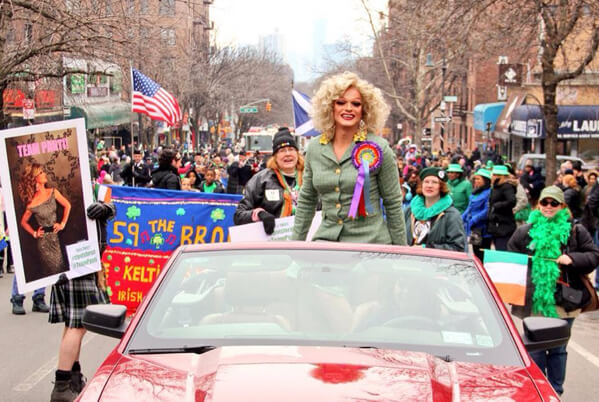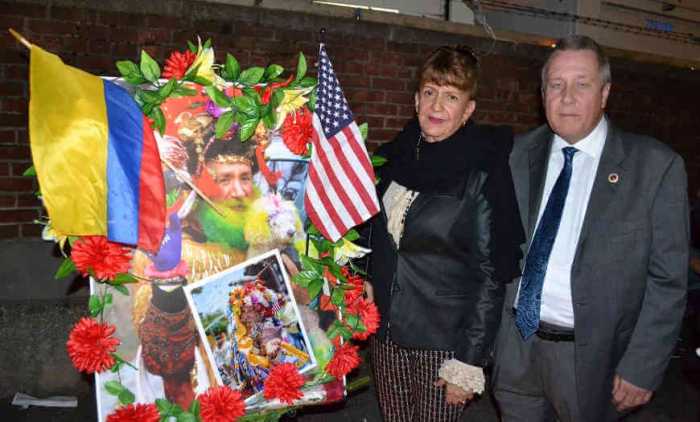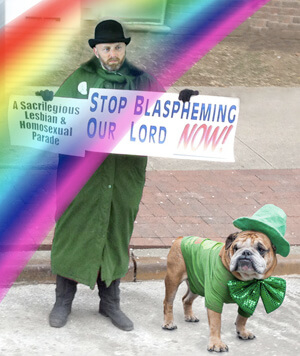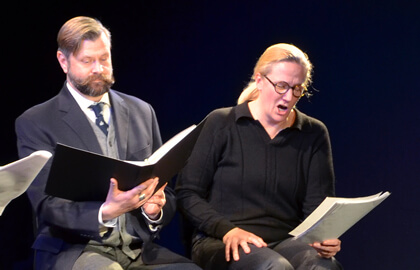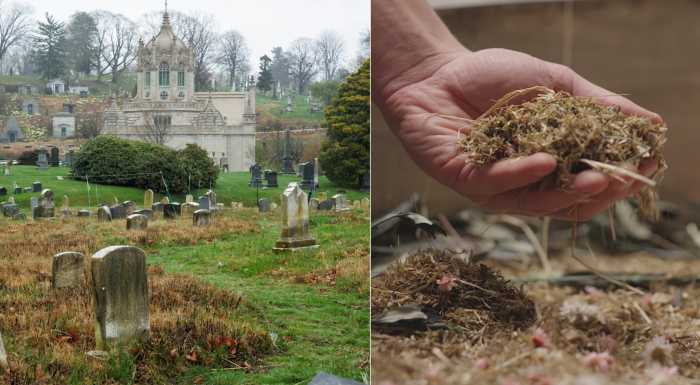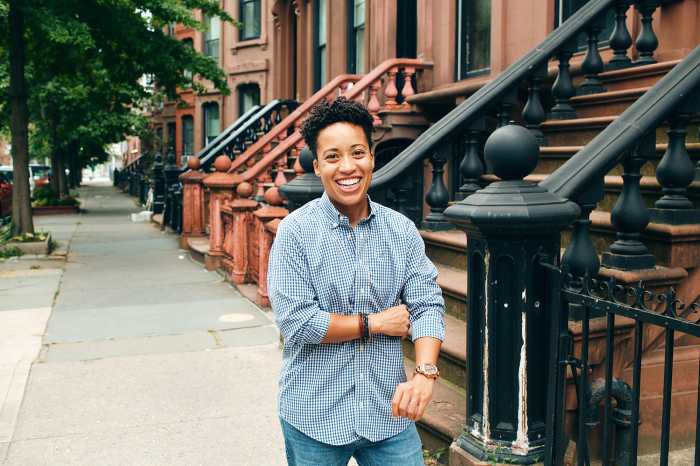Irish activist, performer, and drag queen Panti Bliss, aka Rory O'Neill, in the 2014 St. Pat's For All Parade in Queens. | PANTI BAR
Rory O’Neill and his alter ego, Ireland’s “national fucking treasure” drag queen Panti Bliss, had some adventures onstage and off in their recent sojourn in New York City, less than a month after Ireland went to the polls and voted a resounding “yes” in a marriage equality referendum. Rory is currently taking Panti on a victory lap from her home turf at Dublin’s PantiBar to festivals across Ireland and around the world.
Manhattan’s Irish Arts Center hosted Panti’s show, “High Heels in Low Places” for a short, sold-out run June 8-13. In addition to performing their solo play (and getting a good review from the New York Times), Rory and Panti’s escapades in Manhattan included being asked to leave the Carlyle Hotel (according to Panti’s Twitter feed), meeting Monica Lewinsky, seeing Jinkx Monsoon’s show, and being interviewed by Mx Justin Vivian Bond.
“We had a great time,” said O’Neill, who flew back to Dublin immediately after the last show for another round of touring. “Though it was busy, exhausting.”
A month after Irish “yes” vote, Panti Bliss, Rory O’Neill reflect on what it all meant for Ireland
While neither Panti nor Rory takes credit for the victory for equality in Ireland, O’Neill does acknowledge that the scandal called “Pantigate” was one of the things that set off the intense debate over the last 18 months in Ireland.
It all started on an Irish talk show when Rory suggested that some individuals and organizations were homophobic. Both he and RTE, the Irish public television network that ran the talk show, were sued by the folks he mentioned, and the network, in the end, was required to pay out over 80,000 euros (nearly $100,000) to settle their grievances. As the scandal blew up, Panti was asked to do a Noble Call (an Irish tradition in which a speaker addresses a current topic) at the Abbey Theatre, and a video of it went viral , sparking debate in the media, on the floor of Ireland’s Senate, and among the taxpayers, who didn’t care for the RTE handing over that kind of money.
“I think what the Noble Call did is it sort of kicked off the debate some 18 months out from the referendum,” O’Neill said. “I think before the Noble Call, there was kind of a vague, lazy assumption that Ireland was grand about gay people. And it did start a proper debate about how Ireland treats its gay citizens, about homophobia. That was a conversation the country had not had before properly, and it was high time we had it.”
Marriage equality was up for a vote because Ireland’s Supreme Court ruled that the constitutional definition of marriage was between a man and woman; in order to change that, citizens had to vote on it.
“Lots of other countries have been spurred on by our vote,” O’Neill said. “But really, it would have been much easier to do it legislatively. If we could have, we would have. Every government and non-government [political] party was on board. We were forced to have to do it by a referendum. That was much more risky, much more difficult, and it’s kind of terrifying. If it had been a ‘no’ vote, we would have had to wait another generation to try again.
“It’s also much more difficult to have a referendum because you have to have this huge public debate, have to go knocking door to door, put up posters, and see the ‘No’ posters that were so upsetting, turning on the radio and TV every day to have those debates. It was difficult to listen to. It was not an easy way to do it. But when you’ve done it that way and you get a ‘yes’ vote, the result is much more powerful. People can’t afterwards say: ‘Oh, this was a politician-led thing.’”
O’Neill used Panti’s public pulpit (PantiBar, Facebook, and Twitter) to support the movement. But previously booked tours took them out of the country during some of the run-up, and O’Neill watched from afar as the campaign strategized on both getting out the guaranteed “yes” vote and changing the minds of the wavering and as many “no’s” as possible.
“I think most people saw the whole outcome of the Pantigate thing as being positive for a ‘yes’ vote,” O’Neill said. “Then as we got closer to the polling day, part of the ‘yes’ campaign’s strategy was to get a particular kind of voice out. What they were looking for was the kind of voices that don’t scare the middle ground.”
The grassroots strategy worked: nearly 2 million of Ireland’s 4.8 million population turned out, and “yes” received more than 1.2 million votes, with many mobilized to go to the polls for the first time in their lives.
“If we had done it legislatively or through the courts, it would have been wonderful, but we wouldn’t have had these huge spontaneous street parties that we had,” said Rory, who took Panti through the cheering crowds down to Dublin Castle for the election results. “One thing the referendum reminded everyone here is that there really is a gay community because they worked so hard. We had 18-year-olds going door-to-door, traipsing around the country, putting posters up, having those conversations with their families and neighbors. It was also so inspiring, going out to canvass, finishing your work, then going to the place where everyone was meeting and seeing parents and straight people, straight guys with gay friends. All sorts of people. It was lovely in the end.”
Giving Ireland’s younger generation the idea that they can drive change bodes well for Ireland’s future, O’Neill said.
“Young people came out to vote in huge numbers, and it also introduced to a lot of young people to the idea of campaigning and organizing, and I think it’s hard to put the lid back on that. It’ll be interesting to see how this affects the next general election. Other issues are sort of bubbling up… liberal issues.”
And for Panti, who is first and foremost an artist and entertainer, both the personal and the big picture gave her lots to talk about in her solo show.
“Well, I mean my work has always touched on these subjects anyway,” O’Neill said. “The Pantigate business… obviously the gay stuff is something I’m dealing with in my work all the time. It got to a period where essentially for 18 months people were talking about what I’d been plugging away at for years.”
Panti herself was interrupted during her last performance at the Irish Arts Center when a couple of younger audience members objected to her asking people to self-identify as gay, lesbian, bisexual, or straight. One of them began to proclaim loudly about the gender binary being false, and Panti was having none of that.
“I like when anything happens during a show to create more interest,” O’Neill said. “What annoyed me, first of all, is that it’s a theater show. You talk about it on the train home with your friends. But you don’t try to turn it into a discussion in the middle of the show. But also, her particular point was so silly. Accusing me of propping up the binary! She hadn't listened to anything I’d said. Essentially she wasn’t looking at the arc of the show, just at the last few jokes and misunderstanding them.
“I’m not hung up on labels. The gender studies approach I’ve found, is often from people who came of age online: it’s not necessarily about age, but about people who came to a trans* identity in the age of the Internet. I have lots of trans friends and other friends and we all started out together, running around clubs, genderfucking and then some… Most of us described ourselves as drag queens, some of those people came to a trans* identity, some are transvestites and some call themselves ‘trannies,’ which is a word we still use on this side of the pond. And then some of us are drag queens, somewhere blurred between all of those things. We’re very used to each other — and all girls together in some way. It’s a commonality we all hang onto. Nowadays, you might be 17 years old and discovering all this on the Internet, but never actually have hung out with people whose gender identity is fluid.”
Panti and her creator are looking forward to their return to New York City, perhaps even for a rare vacation.
“I love New York for all the reasons that other people love it,” O’Neill said. “It really is the world’s melting pot. There’s always something happening, no excuse to ever be bored, even for a moment.”
Though, of course, wherever Panti is is rarely boring.

